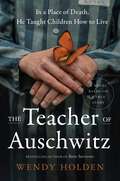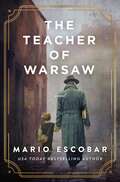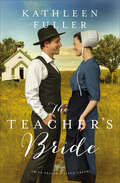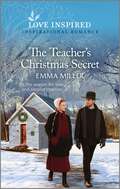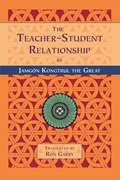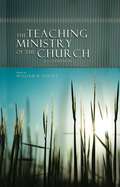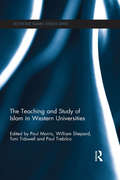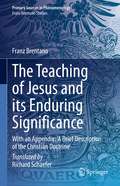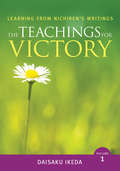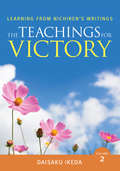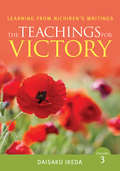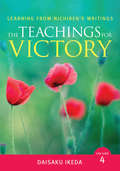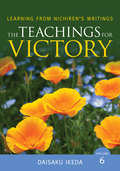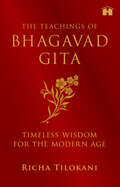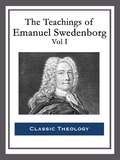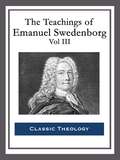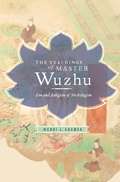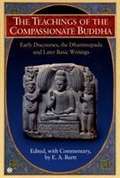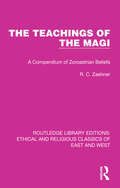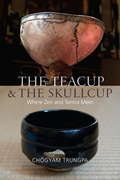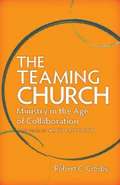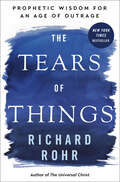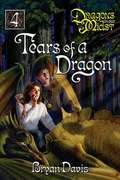- Table View
- List View
The Teacher of Auschwitz: A Novel
by Wendy HoldenFrom the bestselling author of Born Survivors, a novel inspired by the powerful true story of a man who risked everything to protect children in Auschwitz.Fredy built a wall against suffering in their hearts . . .Amid the brutality of the Holocaust, one bright spot shone inside the Nazi death camp of Auschwitz. In the shadows of the smokestacks was a wooden hut where children sang, staged plays, wrote poetry, and learned about the world. Within those four walls, brightly adorned with hand-painted cartoons, the youngest prisoners were kept vermin-free, received better food, and were even taught to imagine having full stomachs and a day without fear. Their guiding light was a twenty-seven-year-old gay, Jewish athlete: Fredy Hirsch.Being a teacher in a brutal concentration camp was no mean feat. Forced to beg senior SS officers for better provisions, Fredy risked his life every day to protect his beloved children from mortal danger.But time was running out for Fredy and the hundreds in his care. Could this kind, compassionate, and brave man find a way to teach them the one lesson they really needed to know: how to survive?The Teacher of Auschwitz shines a light on a truly remarkable individual and tells the inspiring story of how he fought to protect innocence and hope amid depravity and despair.
The Teacher of Warsaw
by Mario EscobarFor fans of The Warsaw Orphan and The Tattooist of Auschwitz: the start of WWII changed everything in Poland irrevocably—except for one man&’s capacity to love.September 1, 1939. Sixty-year-old Janusz Korczak and the students and teachers at his Dom Sierot Jewish orphanage are outside enjoying a beautiful day in Warsaw. Hours later, their lives are altered forever when the Nazis invade. Suddenly treated as an outcast in his own city, Janusz—a respected leader known for his heroism and teaching—is determined to do whatever it takes to protect the children from the horrors to come.When over four hundred thousand Jewish people are rounded up and forced to live in the 1.3-square-mile walled compound of the Warsaw ghetto, Janusz and his friends take drastic measures to shield the children from disease and starvation. With dignity and courage, the teachers and students of Dom Sierot create their own tiny army of love and bravely prepare to march toward the future—whatever it may hold.Unforgettable, devastating, and inspired by a real-life hero of the Holocaust, The Teacher of Warsaw reminds the world that one single person can incite meaning, hope, and love.Praise for The Teacher of Warsaw:&“Through meticulous research and with wisdom and care, Mario Escobar brings to life a heartbreaking story of love and extraordinary courage. I want everyone I know to read this book.&” —Kelly Rimmer, New York Times bestselling author of The Warsaw Orphan&“A beautifully written, deeply emotional story of hope, love, and courage in the face of unspeakable horrors. That such self-sacrifice, dedication and goodness existed restores faith in humankind. Escobar's heart-rending yet uplifting tale is made all the more poignant by its authenticity. Bravo!&” —Tea Cooper, award-winning and bestselling author of The Cartographer&’s SecretWorld War II historical fiction inspired by true eventsIncludes discussion questions for book clubs, a historical timeline, and notes from the authorBook length: 83,000 wordsAlso by author: Auschwitz Lullaby, Children of the Stars, Remember Me, The Librarian of Saint-Malo
The Teacher's Bride: The Teacher's Bride, The Farmer's Bride, The Innkeeper's Bride (Amish Brides of Birch Creek #1)
by Kathleen FullerA fun and heartwarming Amish rom-com where opposites really do attract. If there is one thing Christian Ropp will not allow in his classroom—or his life—it&’s chaos. So why is he drawn to Ruby Glick, a woman who seems to bring mayhem wherever she goes?Christian Ropp moves to Birch Creek to accept a teaching position in the rapidly growing Amish community. He&’s determined to put the rambunctious school in order as well as check another task off his list: finding a wife. Of course, that would be much easier if women were like textbooks, straightforward and logical.When an accident puts Christian out of commission, a new community member named Ruby Glick takes over his classroom. But Ruby&’s exuberant teaching style clashes with Christian's careful methods and he worries his students will never be the same.With a track record of catastrophe, Ruby always feels too clumsy, too distracted, too . . . much. Desperate for a chance to prove that she can do more than make mistakes in her life, she throws herself into her new teaching position. But when Christian can&’t seem to stay out of her way, she finds herself slipping into old, chaotic tendencies.What she doesn&’t anticipate is that Christian's heart is slowly catching up with his mind—and she, too, must decide whether to follow logic or love. The first in the Amish Brides of Birch Creek series (followed by The Farmer&’s Bride and The Innkeeper&’s Bride)A full-length novel, approximately 78,000 wordsA sweet and wholesome Amish romanceCatch up on the Birch Creek community with the Amish of Birch Creek series and Amish Letters series Praise for The Teacher&’s Bride:"A heartwarming story of unexpected romance woven with fun and engaging characters who come to life on every page." --Amy Clipston, bestselling author of A Seat by the Hearth "Kathleen Fuller has written a sweet, oftentimes humorous, romance that reminds readers that the perfect match might be right in front of their noses." --Kelly Irvin, bestselling author of the Every Amish Season series"Kathleen Fuller is a master storyteller and fans will absolutely fall in love with Ruby and Christian in The Teacher's Bride." --Ruth Reid, bestselling author of the Amish Mercies series"Kathy Fuller's characters leap off the page with subtle power as she uses both wit and wisdom to entertain!" --Kelly Long, national bestselling author"The story will captivate you from the first page to the last with Ruby, Christian, and engaging characters. You&’ll laugh, gasp, and wonder what will happen next." --Molly Jebber, Speaker and Award Winning Author of Grace&’s Forgiveness and the Amish Keepsake Pocket Quilt Series
The Teacher's Christmas Secret: An Uplifting Inspirational Romance (Seven Amish Sisters #3)
by Emma MillerThe Amish school brings them together Will his secret break them apart? When widowed schoolteacher Tobit Lapp is injured, he reluctantly agrees he needs Cora Koffman&’s help. Cora&’s still upset Tobit got the job at the Amish schoolhouse, but she agrees to teach his class till he&’s able. As they work together on lessons, a surprising friendship blossoms between them, but Tobit&’s heart is torn. He&’s falling for Cora—yet his secret could ruin everything…From Love Inspired: Uplifting stories of faith, forgiveness and hope.Seven Amish Sisters Book 1: Her Surprise Christmas CourtshipBook 2: Falling for the Amish Bad BoyBook 3: The Teacher's Christmas Secret
The Teacher-Student Relationship
by Jamgon Kongtrul Ron GarryIt is crucial for students of Vajrayana Buddhism to find an authentic wisdom teacher and know how to properly rely upon that teacher in order to awaken to their buddha nature and thereby attain full enlightenment. Fortunately, the topic has been thoroughly explored by Jamgon Kongtrul in the tenth chapter of The Treasury of Knowledge. This essential text clearly lays out what credentials and qualities one should look for in a wisdom teacher, why a wisdom teacher is necessary, and how the relationship between this teacher and disciple best develops once it is established.
The Teaching Ministry of the Church (Second Edition)
by William YountThe second edition of The Teaching Ministry of the Church makes a major overhaul of its predecessor, increasing the content from eighteen to twenty three chapters and contributors from six to thirteen. These writers assert the need for such an expanded update is due to our everchanging world. For example, the rise of Islamic fundamentalism, proliferation of religious sects, and secularization of our culture greatly increase the importance of ensuring the church produces fully developed, biblically informed followers of Jesus. To that end, The Teaching Ministry of the Church presents a full overview of Christian education in four major sections: Theological Foundations, Biblical Foundations, Preparation for Teaching, and Structuring the Teaching Ministry of the Church. Within this framework, a step-by-step plan for establishing and maintaining an effective teaching ministry among preschoolers, children, youth, and adults takes shape. Key chapters: "The Bible as Curriculum," "The Church's Role in Teaching," "Creating an Unforgettable Learning Experience," and "Equipping Teachers. "
The Teaching and Study of Islam in Western Universities (Routledge Islamic Studies Series)
by Paul Trebilco Paul Morris William Shepard Toni TidswellPublic interest in the religion of Islam and in Muslim communities in recent years has generated an impetus for Western Universities to establish an array of Institutes and programs dedicated to the study of Islam. Despite the growth in number of programs dedicated to this study, very little attention has been paid to the appropriate shape of such programs and the assumptions that ought to underlie such a study. The Teaching and Study of Islam in Western Universities attempts to address two central questions that arise through the teaching of Islam. Firstly, what relation is there between the study of the religion of Islam and the study of those cultures that have been shaped by that religion? Secondly, what is the appropriate public role of a scholar of Islam? After extensive discussion of these questions, the authors then continue to address the wider issues raised for the academic community having to negotiate between competing cultural and philosophical demands. This edited collection provides new perspectives on the study of Islam in Western Institutions and will be an invaluable resource for students of Education and Religion, in particular Islamic Studies.
The Teaching of Jesus and its Enduring Significance: With an Appendix: 'A Brief Description of the Christian Doctrine' (Primary Sources in Phenomenology)
by Franz BrentanoHere, for the first time in English, is Franz Brentano’s The Teaching of Jesus, a compendium of texts Brentano assembled for publication shortly before his death that constitute a frank, public settling of accounts with the Christian religion. Originally conceived by Brentano as a volume that might help others similarly led to doubt the doctrines of Christianity, the book is remarkably free of bitterness or spitefulness. On the contrary, what makes the book of singular importance, especially now, is its careful attempt at taking stock of the positive and negative influence Christianity has had in history. This text appeals to those researchers and scholars interested in the work of Franz Brentano and his work on the philosophy of religion, in this case, Christianity.
The Teachings for Victory, Volume 1 (Learning from Nichiren's Writings)
by Daisaku IkedaWhat constitutes a meaningful life? What is true happiness? Nichiren Buddhism, based on the Lotus Sutra, is a teaching of hope that provides answers to these and other important questions for modern life. Ranked among the most important works in Mahayana Buddhism, Nichiren’s 13th century writings were revolutionary. They provide a practical formula for enabling everyone to achieve a victory in every aspect of their lives and attain an unshakable state of happiness.
The Teachings for Victory, Volume 2 (Learning from Nichiren's Writings)
by Daisaku IkedaNichiren Daishonin’s writings provide a practical formula for enabling all people to achieve victory in every aspect of their lives and attain an unshakable state of happiness. This volume of Learning from Nichiren’s Writings: The Teachings for Victory contains SGI President Daisaku Ikeda’s lectures on seven of Nichiren’s letters: "On Practicing the Buddha’s Teachings"; "The Proof of the Lotus Sutra"; "The Hero of the World"; "The Blessings of the Lotus Sutra"; "The Sutra of True Requital"; "King Rinda"; and "The Kalpa of Decrease."
The Teachings for Victory, Volume 3 (Learning from Nichiren's Writings)
by Daisaku IkedaNichiren Daishonin’s writings provide a practical formula for enabling all people to achieve victory in every aspect of their lives and attain an unshakable state of happiness. This volume of Learning from Nichiren’s Writings: The Teachings for Victory contains SGI President Daisaku Ikeda’s lectures on nine of Nichiren’s letters: “On the Offering of a Mud Pie” “A Father Takes Faith” “How Those Initially Aspiring to the Way Can Attain Buddhahood through the Lotus Sutra” “Letter to the Lay Priest Nakaoki” “Letter to Konichi-bo” “The Good Medicine for All Ills” “The Four Debts of Gratitude” “On the Treasure Tower” “Letter from Teradomari” President Ikeda elucidates the importance of studying Nichiren’s writings as the foundation of Nichiren Buddhism as practiced by the Soka Gakkai International. His lectures bring Nichiren’s immense wisdom, compassion, and courage into focus for the present age. In reading and studying these lectures, we learn how to apply in daily life Nichiren’s profound philosophy for inner transformation and victory for both ourselves and others. The Teachings for Victory will empower you to develop the strength and wisdom to bring forth your inherent potential.
The Teachings for Victory, Volume 4 (Learning from Nichiren's Writings)
by Daisaku IkedaNichiren Daishonin’s writings provide a practical formula for enabling all people to achieve victory in every aspect of their lives and attain an unshakable state of happiness. This volume of Learning from Nichiren’s Writings: The Teachings for Victory contains SGI President Daisaku Ikeda’s lectures on nine of Nichiren’s letters: “On the Real Aspect of the Gohonzon” “The Four Virtues and the Four Debts of Gratitude” “A Ship to Cross the Sea of Suffering” “Flowering and Bearing Grain” “General Stone Tiger” “Reply to Niiama” “The Workings of Brahma and Shakra” “Reply to Yasaburo” “The Three Obstacles and Four Devils” President Ikeda elucidates the importance of studying Nichiren’s writings as the foundation of Nichiren Buddhism as practiced by the Soka Gakkai International. His lectures bring Nichiren’s immense wisdom, compassion, and courage into focus for the present age. In reading and studying these lectures, we learn how to apply in daily life Nichiren’s profound philosophy for inner transformation and victory for both ourselves and others. The Teachings for Victory will empower you to develop the strength and wisdom to bring forth your inherent potential.
The Teachings for Victory, vol. 6: The Teachings For Victory, Vol. 6 (Learning from Nichiren's Writings)
by Daisaku IkedaNichiren Daishonin's writings provide a practical formula for enabling all people to achieve victory in every aspect of their lives and attain an unshakable state of happiness.This volume of Learning from Nichiren's Writings: The Teachings for Victory contains two commemorative lectures (November 18 and May 3) by SGI President Daisaku Ikeda in addition to lectures on seven of Nichiren's letters:"False Official Documents""The Eight Winds""The Wealthy Man Sudatta""New Year's Gosho""The Difficulty of Sustaining Faith""Letter to the Sage Nichimyo""The One-eyed Turtle and the Floating Log"President Ikeda elucidates the importance of studying Nichiren's writings as the foundation of Nichiren Buddhism as practiced by the Soka Gakkai International. His lectures bring Nichiren's immense wisdom, compassion, and courage into focus for the present age. In reading and studying these lectures, we learn how to apply in daily life Nichiren's profound philosophy for inner transformation and victory for both ourselves and others.The Teachings for Victory will empower you to develop the strength and wisdom to bring forth your inherent potential.
The Teachings of Bhagavad Gita: Timeless Wisdom for the Modern Age
by Richa TilokaniWhy does one face sorrow and problems in life? What can allay the anxiety and stress inherent in the materialistic modern society? How can one get in touch with higher consciousness and strike a balance between the spiritual and worldly goals? If you are looking for answers to questions like these and searching for ways to empower your life, begin the quest with this volume, which presents the essence of one of the world&’s most sacred texts in a simple and easy-to-understand manner.The Bhagavad Gita, a treasure trove of divine wisdom, was shared by Lord Krishna with Arjuna, the Pandava prince, at the battlefield of Kurukshetra, right before the Mahabharata or the &‘Great War&’ began. It comprises 700 Sanskrit shlokas translated into English, which inspire one to seek and understand the profound truths of life through the ancient principles of Karma Yoga (the art of work), Gyan Yoga (the art of knowledge) and Bhakti Yoga (the art of devotion). These eternal principles help to live life to the fullest, so that one can work better, think better and live better by tapping into higher consciousness, accessing the spiritual dimension and nurturing the pure self.The Teachings of Bhagavad Gita is a perfect source to discover the art of self-empowerment by exploring the various facets of this most sacred text and imbibing its all-encompassing wisdom to attain unending joy, peace and success.
The Teachings of Emanuel Swedenborg: Heaven and Hell; Divine Love and Wisdom; Divine Providence
by Emanuel SwedenborgIn 'Heaven and Hell,' Swedenborg gives the reader a detailed description of the afterlife. He deals with God, heaven, hell, angels, spirits, and devils; and he addresses the issues of who is in heaven and hell. Are there any Jews, Muslims, and people of pre-Christian times such as pagan Romans and Greeks in heaven? He posits that the love of self or of the world drives one towards hell, and love of God and fellow men towards heaven. Here is the most influential and important book ever written on the subject! In 'Divine Love and Wisdom,' Swedenborg uses reason and empirical facts to prove the existence of God and God's divine love. He further posits that we are all an essential part of God's Divine plan, and that without us God's plan could not come to fruition. In 'Divine Providence,' Swedenborg explains why it is that we cannot always see God's hand in our chaotic world. Why tragedy and war are allowed to happen and how these things relate to us. If God were to remove all tragedies from our lives, of what worth would free will be?
The Teachings of Emanuel Swedenborg: Last Judgment; Last Judgment Continued; Last Judgment Posthumous
by Emanuel SwedenborgSwedenborg experienced dreams and visions in which he was appointed by the Lord to write a heavenly doctrine to reform Christianity. He claimed that the Lord had opened his eyes, so that he could freely visit heaven and hell and talk with angels, demons, and other spirits. His best known book is 'Heaven and Hell.' The destruction of the world is not meant by the day of the last judgment. Those who have not known the spiritual sense of the Word, have understood that everything in the visible world will be destroyed in the day of the Last Judgment; for it is said, that heaven and earth are then to perish, and that God will create a New Heaven and a New Earth. Here are all three of his 'Last Judgment' books, 'Last Judgment,' 'Last Judgment Continued,' and 'Last Judgment Posthumous.'
The Teachings of Emanuel Swedenborg: Vol. II
by Emanuel SwedenborgThe New Jerusalem and its Heavenly Doctrine is a wonderful introduction to the beliefs of the New Church and an overview of its theological foundations. Here Emanuel Swedenborg discusses faith, love, goodness and truth, heaven and hell, divine providence, the holy sacraments, and much much more. For those wishing to explore the writings of Emanuel Swedenborg this is a perfect starting place. Also included in this volume are the short works White Horse, Brief Exposition, De Verbo, God the Savior, and Interaction of the Soul and Body. Emanuel Swedenborg was a Swedish scientist, philosopher, Christian mystic, and theologian. Swedenborg experienced dreams and visions in which he was appointed by the Lord to write a heavenly doctrine to reform Christianity. He claimed that the Lord had opened his eyes, so that he could freely visit heaven and hell and talk with angels, demons, and other spirits. His best known book is Heaven and Hell.
The Teachings of Master Wuzhu: Zen and Religion of No-Religion (Translations from the Asian Classics)
by Wendi AdamekThe Record of the Dharma-Jewel Through the Generations (Lidai fabao ji) is a little-known Chan/Zen Buddhist text of the eighth century, rediscovered in 1900 at the Silk Road oasis of Dunhuang. The only remaining artifact of the Bao Tang Chan school of Sichuan, the text provides a fascinating sectarian history of Chinese Buddhism intended to showcase the iconoclastic teachings of Bao Tang founder Chan Master Wuzhu (714–774). Wendi Adamek not only brings Master Wuzhu's experimental community to life but also situates his paradigm-shifting teachings within the history of Buddhist thought. Having published the first translation of the Lidai fabao ji in a Western language, she revises and presents it here for wide readership.Written by disciples of Master Wuzhu, the Lidai fabao ji is one of the earliest attempts to implement a "religion of no-religion," doing away with ritual and devotionalism in favor of "formless practice." Master Wuzhu also challenged the distinctions between lay and ordained worshippers and male and female practitioners. The Lidai fabao ji captures his radical teachings through his reinterpretation of the Chinese practices of merit, repentance, precepts, and Dharma transmission. These aspects of traditional Buddhism continue to be topics of debate in contemporary practice groups, making the Lidai fabao ji a vital document of the struggles, compromises, and insights of an earlier era. Adamek's volume opens with a vivid introduction animating Master Wuzhu's cultural environment and comparing his teachings to other Buddhist and historical sources.
The Teachings of Smith Wigglesworth
by Smith WigglesworthLegendary evangelist Smith Wigglesworth dramatically changed the world with his passionate messages. The essence of his dynamic ministry is relived through the complete volume of his life teachings.Sermons have been gathered from archives around the world to create this unequaled treasure. Discover for yourself numerous sermons that have never been published before. You will see why Smith Wigglesworth is considered the pioneer of the modern Pentecostal faith.Raising the dead was only one amazing facet of Smith Wigglesworth's ministry. This great apostle of faith walked in such an astounding measure of God's anointing that miracles in his ministry were second to his message. In his lifetime, Wigglesworth gave new meaning to the word adventure. Adventure's only requirement-"Only believe!"Experience the adventure that was Smith Wigglesworth's life. This complete collection of Smith Wigglesworth's powerful sermons is sure to be a classic for countless generations.
The Teachings of the Compassionate Buddha
by E. A. BurttBuddhism is a system of thought that has enriched the religious lives of billions--and in more recent times, swept through the Western world as well. Now anyone who wants to learn more about Buddhism can go directly to the source, with this collection of original documents.
The Teachings of the Magi: A Compendium of Zoroastrian Beliefs (Ethical and Religious Classics of East and West #10)
by R. C. ZaehnerOriginally published in 1956, this book provides a clear, scholarly, introduction to the main tenets of Zoroastrian dualism presented largely in the words of the Zoroastrian texts themselves. The book demonstrates the essential reasonableness of Zoroastrian dualism, which is the dualism of a good and an evil spirit, and to show what the means in everyday life and how it is philosophically justified. There are chapters on cosmology, the relation of man to God, the nature of religion, ethics, sacraments and sacrifice, the soul’s fate at death and eschatology.
The Teacup and the Skullcup: Where Zen and Tantra Meet
by David Schneider Chogyam Trungpa Judith L. LiefThe Teacup and the Skullcup is made up of edited transcripts from two seminars that Chögyam Trungpa gave near the beginning of his North American teaching career in 1974--one in Barnet, Vermont, and one in Boston--called "Zen and Tantra." Although Trungpa Rinpoche belonged to the tantra tradition, he acknowledged the strength and discipline gained from Zen influence. Through these talks you can see his respect for the Zen tradition and how it led to his using certain Zen forms for his public meditation hall rituals. He discusses the differences in style, feeling, and emphasis that distinguish the two paths and shows what each one might learn from the other.Also included are Trungpa Rinpoche's commentary on the Ten Oxherding Pictures and an essay he composed in memory of Shunryu Suzuki Roshi, a close friend with whom he continually exchanged ideas for furthering buddhadharma in America.
The Teaming Church: Ministry in the Age of Collaboration
by Robert C. CrosbyA committee is not the same thing as a team.To become a great team, a group must have a goal that is deeply challenging, a leader who is creatively empowering, and a willingness to work within a collaborative community that honors the Bible.The Bible is full of examples of great things accomplished through teaming leaders. Scripture also provides a compelling model from which church communities and teams can learn to live and serve in light of the "Divine Team" - the Trinity. Author Robert C. Crosby provides several innovative ways in which biblical teams reflect the workings and nature of the Trinity and thus the image of God.Revealing what he calls "The Four C's of Great Teams" - The Character, The Carrot, The Coach, and The Context - Crosby shows how successful teams reach their goals more effectively. Conversely, he also addresses the "Four Fatal Teaming Errors" and how to avoid unnecessary, time-consuming missteps.This book provides biblical motivations, vivid examples, and practical approaches for creating a teaming culture in any faith community. Crosby, a leader who has built teams as a senior pastor, youth leader, and university administrator, is now training and mentoring a new generation of pastors and leaders.
The Tears of Things: Prophetic Wisdom for an Age of Outrage
by Richard RohrIn his first major work since The Universal Christ, one of our most prominent spiritual voices offers a wholehearted and hope-filled model for the world today, grounded in the timeless wisdom of the Hebrew prophets. <p> “Richard Rohr is one of the great Christian spiritual masters of our time. Of any time.”—James Martin, SJ, author of Come Forth. <p> How do we live compassionately in a time of violence and despair? What can we do with our private disappointments and the anger we feel in such an unjust world? In his most personal book yet, Richard Rohr turns to the writings of the Jewish prophets, revealing how some of the lesser-read books of the Bible offer us a crucial path forward today. The prophets’ writings reflect the full spectrum of human maturity. In almost every case, their initial rage and their accusatory words evolve into a profound pathos and lamentation about our shared human condition and the world’s suffering. Through astute critiques of culture and institutions, and their journey from anger to sadness, and ultimately compassion, the prophets exemplify what Rohr calls “sacred criticism”—a distinct approach to confronting evil and injustice that acknowledges the wholeness of history, the interconnectedness of every living being, and the reality of a divine and universal love. In this, they set the stage for Jesus, who follows this identical pattern. <p> Drawing on a century of biblical scholarship and written in the warm, pastoral voice that has endeared Rohr to millions, The Tears of Things breathes new life into ancient wisdom. It paves a path of enlightenment for anyone seeking a compassionate way of living in a hurting world. <b>New York Times Bestseller</b>
The Tears of a Dragon (Dragons in Our Midst #4)
by Bryan DavisA vicious evil threatens mankind, and only the dragons can defeat it. With their lives hanging in the balance, Billy and Bonnie lead the dragons into the final battle between the dragons and the slayers.
